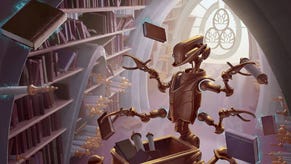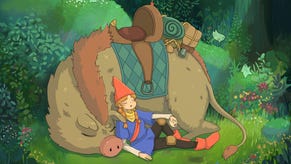Public libraries are using D&D to forge friendships and build community
No Knowledge (Arcana) check required.
Dungeons & Dragons has ventured forth from the Forgotten Realms and into the forefront of pop culture after featuring in several television shows, celebrity charity streams and the success of actual play YouTube series and podcasts. In fact, tabletop roleplaying games have become so mainstream that even public libraries are getting into the scene.
Many libraries began purchasing game guides years ago as part of their circulating collection, letting would-be game masters and dungeon-crawlers bypass the upfront investment to begin their journeys into these strange, new worlds. In an effort to help visitors take advantage of these collections, librarians started hosting D&D programmes. “Honestly most of them [people] came originally out of sheer curiosity,” says Casey, a Young Adult librarian in Wakefield, Massachusetts.
For many of us, there are only a couple of local brick-and-mortar game stores and not all of them are capable of hosting events. Board game cafés might be popular in cities and college towns, but harder to find in the suburbs and rural neighbourhoods. Public libraries are safe spaces in the community, requiring no outside affiliation to qualify for entry, a place where everyone is welcome. They have meeting rooms, big tables and you can visit without expectation to buy anything, just join in the game. Sometimes the library will even pay for the pizza!
These library programmes not only introduce players to tabletop RPGs, but often to each other.
These programmes at the library not only introduce players to tabletop RPGs, but often to each other. They might drag a friend along for the first game, but usually those in attendance have never met before and become fast friends. For those who are more introverted and struggle to make friends, these programs can introduce them to people like them. “We frequently got comments from parents about how much they appreciated the group, as they felt their teens didn't make friends easily at school but had found friends in the D20 group,” says Becca Tucker, a staff member at Odenton Library. Those same parents requested that the library start an adult programme so they could play together and make new friends too.

Many of the programmes are targeted at teens. This age group faces barriers such as lack of disposable income for purchasing game guides, rulebooks and dice. They don’t have access to transportation to get to a game store’s event and many parents might not feel comfortable taking their child to a location downtown. But if their kid asks to go to the library right around the corner, how can they say no?
We all remember the trials and tribulations of adolescence, trying to figure out who we are and who we want to be. Teens use their characters as an opportunity to try out new personalities, different genders, and explore their complex and evolving emotions. “We got a wonderful shout-out recently from the local PFLAG group [an organisation for families with LGBTQIA+ children], who mentioned our programme as a place where LGBTQ kids felt comfortable,” says Kristi Cates from Normal Public Library. “One boy [...] told me he felt like this was one of the only places he could really express his anger and frustrations safely.” Another parent mentioned their son is on the autism spectrum and was able to connect better with other kids while roleplaying.
When COVID hit, librarians knew it was important not to lose touch with their players. They quickly taught themselves how to use services such as Zoom, Discord and Roll20 to facilitate games online. The desire to play and escape reality for a few hours was stronger than ever; groups that started out meeting once a month asked to meet once a week. “I've got a couple emails from parents saying it's basically the only social interaction their kid gets every week and it's been critical for their mental health in all this,” says Meagan, an Adult Services librarian at Naperville Library in Illinois.
Shifting games online provided some unexpected advantages. Players who had trouble getting to programmes at the library before were able to join the adventure online. Teens stuck at home would find the event and only need the internet to connect with the party, no ride from Mom or Dad required. For one group, the change to playing online led to a happy reunion with a player who had moved 900 miles away the year before.
Librarians are talking about roleplaying games on a national level now, sharing their stories of connecting with teens and adults through the game. But not every community is lucky enough to have a librarian who is also an experienced DM. If reading this has made you curious about your public library, check out their website. If you don’t see a D&D group, reach out and ask about starting one. Perhaps you could share your expertise and help the next generation start out on their first adventure.










